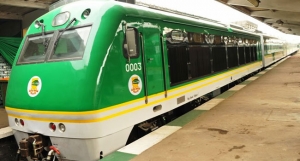 Train services from northern Nigerian State, Kano, to Pot Harcourt, the capital of Rivers State, have started, twelve years after the Nigerian government launched a revitalisation project of the railway.
Train services from northern Nigerian State, Kano, to Pot Harcourt, the capital of Rivers State, have started, twelve years after the Nigerian government launched a revitalisation project of the railway.
The mixed service train will leave Kano to Port Harcourt every Thursday and from Port Harcourt to Kano every Tuesday.
At the commissioning ceremony of the new trains in Kano on Thursday, the Managing Director of the Nigeria Railway Cooperation (NRC), Adesiyi Asijuwade, said train services in Nigeria was back on track.
The first Kano-Port Harcourt mixed train services was in 1914, technically carrying both passenger and goods from the north to southern part of Nigeria.
However, in view of the ongoing efforts by the NRC, train services are now being resuscitated in phases across Nigeria.
Two 68-seater air conditioned modern first class passenger couches had been put in place to traverse a rail distance of 1,139 kilometres, stretching from Kano to Port Harcourt, with stops at some cities across Kano, Kaduna and Benue among other states in the south.
Kano State Governor, Abdullahi Ganduje, represented by the Speaker State House of Assembly, Alhassan Doguwa, assured the corporation of the State government’s continued support and patronage.
At the event, the Emir of Kano Muhammadu Sunusi II, urged the management of the NRC to ensure continuity of the train services at an affordable price in order to allow free flow of economic exchange between the south and northern parts of Nigeria.
“We are indeed happy that train services from Kano to Port Harcourt have returned and we pray that Allah will ensure the continuity of the program and may it be a source of our economic strength,” the Emir prayed.
During the British colonial era, train services were regular and one of the best means of transportation in Nigeria, but lack of maintenance of the infrastructure led to a huge setback in that sector, forcing business owners to rely solely on the use of trucks for the movement of goods from one part of the nation to the other.
The dearth in the sector further affected the movement of agricultural produce from farm settlements that were located in towns where the rail line traverse.
The resuscitation of the train services will no doubt bring succour to farmers that may need to move produce from Kano to states along the rail line and in southern Nigeria.


